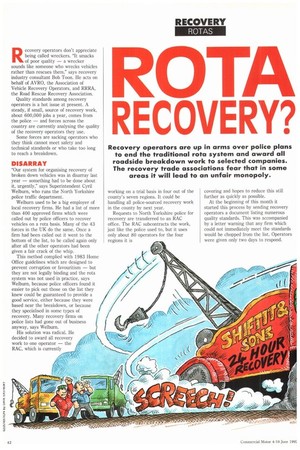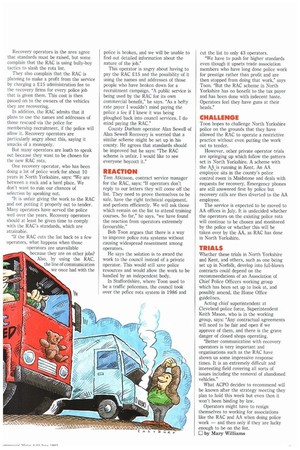ROTA RECOVERY?
Page 44

Page 45

If you've noticed an error in this article please click here to report it so we can fix it.
Recovery operators are up in arms over police plans to end the traditional rota system and award all roadside breakdown work to selected companies. The recovery trade associations fear that in some areas it will lead to an unfair monopoly. Recovery operators don't appreciate being called wreckers. "It smacks of poor quality — a wrecker sounds like someone who wrecks vehicles rather than rescues them," says recovery industry consultant Bob Toon. He acts on behalf of AVRO, the Association of Vehicle Recovery Operators, and RRRA, the Road Rescue Recovery Association.
Quality standards among recovery operators is a hot issue at present. A steady, if small, source of recovery work, about 600,000 jobs a year, comes from the police — and forces across the country are currently analysing the quality of the recovery operators they use.
Some forces are sacking operators who they think cannot meet safety and technical standards or who take too long to reach a breakdown.
DISARRAY
"Our system for organising recovery of broken down vehicles was in disarray last year — something had to be done about it, urgently," says Superintendent Cyril Welburn, who runs the North Yorkshire police traffic department.
Welburn used to be a big employer of local recovery firms. He had a list of more than 400 approved firms which were called out by police officers to recover vehicles on a rota basis. Many of the 43 forces in the UK do the same. Once a firm had been called out it went to the bottom of the list, to be called again only after all the other operators had been given a fair crack of the whip.
This method complied with 1983 Home Office guidelines which are designed to prevent corruption or favouritism — but they are not legally binding and the rota system was not used in practice, says Welburn, because police officers found it easier to pick out those on the list they knew could be guaranteed to provide a good service, either because they were based near the breakdown, or because they specialised in some types of recovery. Many recovery firms on police lists had gone out of business anyway, says Welburn.
His solution was radical. He decided to award all recovery work to one operator — the RAC, which is currently working on a trial basis in four out of the county's seven regions. It could be handling all police-sourced recovery work in the county by next year.
Requests to North Yorkshire police for recovery are transferred to an RAC office. The RAC subcontracts the work, just like the police used to, but it uses only about 80 operators for the four regions it is covering and hopes to reduce this still further as quickly as possible.
At the beginning of this month it started this process by sending recovery operators a document listing numerous quality standards. This was accompanied by a letter warning that any firm which could not immediately meet the standards would be chopped from the list. Operators were given only two days to respond. Recovery operators in the area agree that standards must be raised, but some complain that the RAC is using bully-boy tactics to slash the rota list.
They also complain that the RAC is planning to make a profit from the service by charging a £15 administration fee to the recovery firms for every police job that is given them. This cost is then passed on to the owners of the vehicles they are recovering.
In addition, the RAC admits that it plans to use the names and addresses of those rescued via the police for membership recruitment, if the police will allow it, Recovery operators are particularly angry about this, saying it smacks of a monopoly.
But many operators are loath to speak out because they want to be chosen for the new RAC rota.
One recovery operator, who has been doing a lot of police work for about 10 years in North Yorkshire, says: "We are between a rock and a hard place. We don't want to ruin our chances of selection by speaking out.
"It is unfair giving the work to the RAC and not putting it properly out to tender. Many operators have served the police well over the years. Recovery operators should at least be given time to comply with the RAC's standards, which are attainable.
"If the RAC cuts the list back to a few operators, what happens when those operators are unavailable because they are on other jobs? Also, by using the RAC, the line of communication we once had with the police is broken, and we will be unable to find out detailed information about the nature of the job."
This operator is angry about having to pay the RAC £.15 and the possibility of it using the names and addresses of those people who have broken down for a recruitment campaign. "A public service is being used by the RAC for its own commercial benefit," he says. "As a hefty rate payer I wouldn't mind paying the police a fee if I knew it was being ploughed back into council services. I do mind paying the RAC."
County Durham operator Alan Sewell of Alan Sewell Recovery is worried that a similar scheme might be set up in his county. He agrees that standards should be improved but he says: "The RAC scheme is unfair. I would like to see everyone boycott it."
REACTION
Tom Atkinson, contract service manager for the RAC, says: "If operators don't reply to our letters they will come off the list. They need to prove themselves to be safe, have the right technical equipment, and perform efficiently. We will ask those which remain on the list to attend training courses. So far," he says, "we have found the reaction from operators extremely favourable."
Bob Toon argues that there is a way to improve police rota systems without causing widespread resentment among operators.
He says the solution is to award the work to the council instead of a private operator. This would still save police resources and would allow the work to be handled by an independent body.
In Staffordshire, where Toon used to be a traffic policeman, the council took over the police rota system in 1986 and cut the list to only 43 operators.
"We have to push for higher standards even though it upsets trade association members who have long done police work for prestige rather than profit and are then stopped from doing that work," says Toon. "But the RAC scheme in North Yorkshire has no benefit to the tax payer and has been done with indecent haste. Operators feel they have guns at their heads."
CHALLENGE
Toon hopes to challenge North Yorkshire police on the grounds that they have allowed the RAC to operate a restrictive practice without even putting the work out to tender.
However, other private operator trials are springing up which follow the pattern set in North Yorkshire. A scheme with the Ais running in Kent. An AA employee sits in the county's police control room in Maidstone and deals with requests for recovery. Emergency phones are still answered first by police but recovery calls are then diverted to the AA employee.
The service is expected to be moved to AA offices in July. It is undecided whether the operators on the existing police rota will continue to be chosen and monitored by the police or whether this will be taken over by the AA, as RAC has done in North Yorkshire.
TRIALS
Whether these trials in North Yorkshire and Kent, and others, such as one being set up in Norfolk, develop into full-blown contracts could depend on the recommendations of an Association of Chief Police Officers working group which has been set up to look at, and possibly amend, the Home Office guidelines.
Acting chief superintendent at Cleveland police force, Superintendent Keith Mason, who is in the working group, says: "Any contractual agreements will need to be fair and open if we approve of them, and there is the grave danger of closed shops operating.
"Better communication with recovery operators is very important and organisations such as the RAC have shown us some impressive response times. It is an extremely difficult and interesting field covering all sorts of issues including the removal of abandoned vehicles." .
What ACPO decides to recommend will be known after the strategy meeting they plan to hold this week but even then it won't been binding by law.
Operators might have to resign themselves to working for associations like the RAC and AA when doing police work — and then only if they are lucky enough to be on the list.
by Mary Williams














































































































